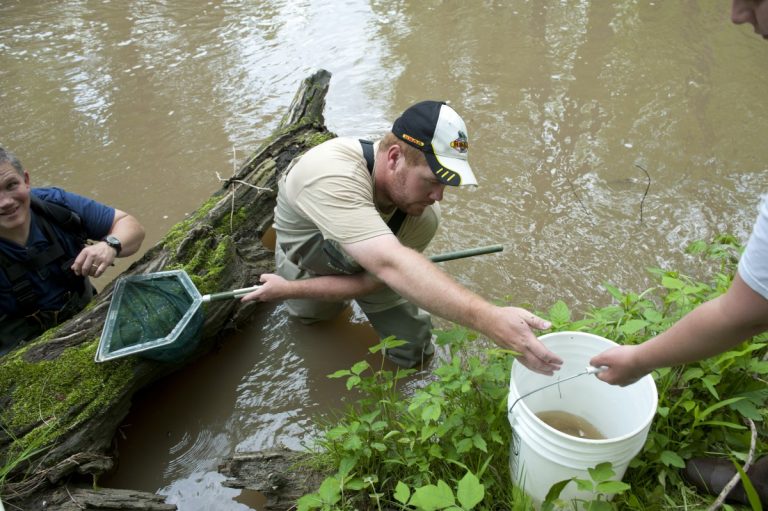
Nestled in Columbus, Ohio’s thriving state capital, The Ohio State University has delivered an outstanding education for 148 years. As one of the largest and most comprehensive universities in the nation, Ohio State is an increasingly popular choice for the international applicant, embracing the values of diversity and integration which invigorate campus life.
Ohio State is well known for its position as a beacon of excellence and a lab for innovation. Here, students are urged to challenge set conventions; to treat education as a constant quest for knowledge and unleash their full potential on an awaiting world. It is a place where lifelong friendships are forged, memories are created and where lasting professional networks are born.
Protect the earth with the School of Environment and Natural Resources at The Ohio State University
The School of Environment and Natural Resources (SENR) is an interdisciplinary school within the College of Food, Agricultural, and Environmental Sciences (CFAES) at Ohio State. CFAES is a highly-specialized college dedicated to the study of the earth, agriculture and the environment at large. Working on what American President and naturalist Teddy Roosevelt labelled “the great central task of leaving this land even a better land for our descendants than it is for us”, the college does everything it can to preserve the earth and its finite resources. CFAES students, staff and scientists alike work side by side to improve quality of life in Ohio and the wider world, creating long-term sustainable solutions to the most urgent issues of our time.

Understanding the pressures attached to studying overseas, non-native students who choose Ohio State gain access to an unparalleled system of support. While Student Services are on hand to maintain your health and wellness, a wide range of clubs and organizations keep things active and fast-paced, ensuring you are not alone in your study abroad adventure.
“Students will gain real world advantages and form professional relationships with our faculty, who are dedicated to bringing knowledge, passion, and hands-on experience into the classroom,” the CFAES website notes.
SENR offers an MS and PhD degree as well as a professional Master of Environment and Natural Resources (MENR) degree, all of which allow students to benefit from the expertise of faculty instructors in both natural sciences and social sciences. The graduate faculty of the school is composed of experts and distinguished scholars from a diverse spectrum of natural and social sciences and organized into seven specialization areas, which are broadly focused areas of study: ecological restoration, ecosystem science, environmental social sciences, fisheries and wildlife science, forest science, rural sociology, and soil science.
Students who choose SENR benefit from the many resources offered by a well-funded school, on top of claiming the perks that come with study at a large-scale research institution. Graduate students in SENR are eligible to receive funding for travel to a conference once per year, producing qualified graduates who are enriched with dynamic global perspectives.
The Master of Environment and Natural Resources (MENR) at Ohio State
Targeting recent undergraduates who seek a competitive edge, as well as mid-career professionals looking for advancement in their field, the MENR is a 36-hour credit program that is both rigorous and flexible. Some of the program’s most popular fields of study include wildlife, climate change, environmental impact assessment, agriculture, sustainability, ecological restoration and remediation.
All MENR students receive foundational instruction in ecological, social and legal issues relating to the environment and natural resources, guaranteeing a breadth and depth of exposure to interrelated disciplines. Students can also take courses from other departments – such as the John Glenn College of Public Affairs, where participants can learn, for example, about the effective management of NGOs and their finances. In fact, some students jump at the chance to pursue two Ohio State master’s degrees at the same time.

This intimate two-year, full-time program gives students the chance to pursue additional coursework specifically tailored to their career aspirations. Students receive one-to-one attention from experienced members of faculty, ensuring they draw the best results from a globally-relevant degree. And with research connections across the US and exciting locations overseas – including China and Tanzania – students gain invaluable expertise from all four corners of the globe.
One thing that makes the program unique is the provision of a compulsory, credit-granting internship placement. Former students have taken on paid, unpaid or volunteer roles with local, state and national corporations within the private sector, as well as with non-profits and government agencies.
While internships provide opportunities to network and develop niche skills, SENR also hosts the Environmental Professionals Network. These monthly meetings with professionals put students face-to-face with the field’s powerful movers and shakers, giving them frequent access to insights on today’s most pressing dilemmas.
“Students select the MENR for its theory-into-practice orientation,” the program website states. “Outcomes for our alumni are as diverse as their interests,” it adds. “Alumni have gone on to gain a variety of employment, including government, private, and non-profit employers. Those seeking public employment have found it at all levels, such as Columbus Metro Parks, the Ohio EPA and Division of Wildlife, and the US Department of State.”
Above all else, the knowledge and skillsets developed through the MENR degree are instantly applicable to a complex global market. While SENR continues to conserve the earth for future generations, MENR graduates are at the frontline of the fight – an effort that will help them soar in a competitive graduate world.
Follow The Ohio State University on Facebook, Twitter, YouTube and Instagram
Liked this? Then you’ll love these…
Living Laboratories: 5 APAC leaders of environmental studies
Universities that produce the next generation of Environmental advocates







